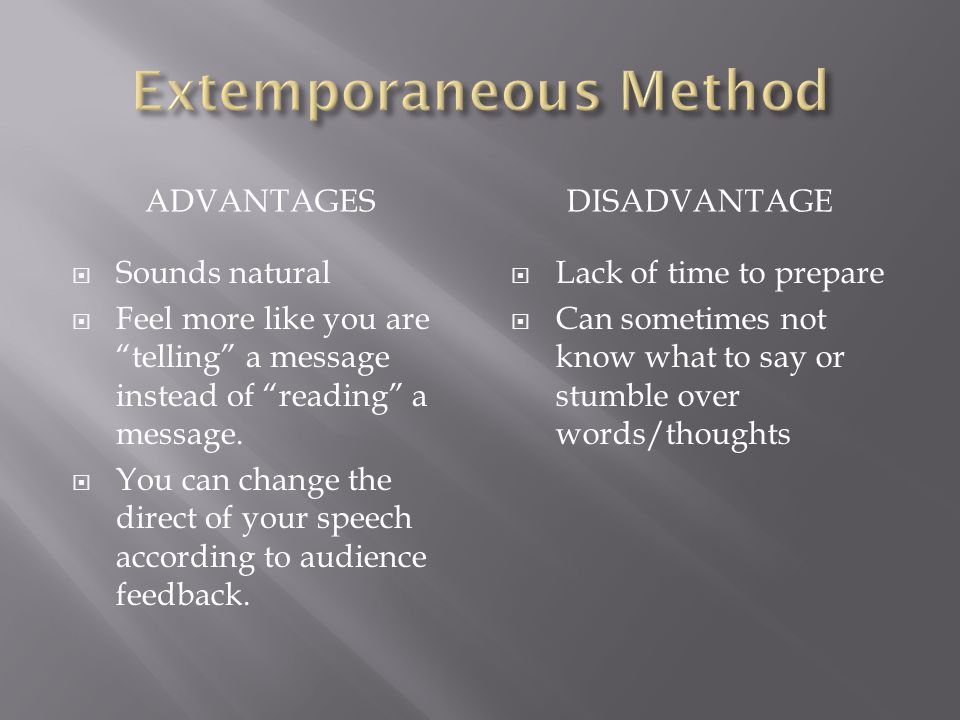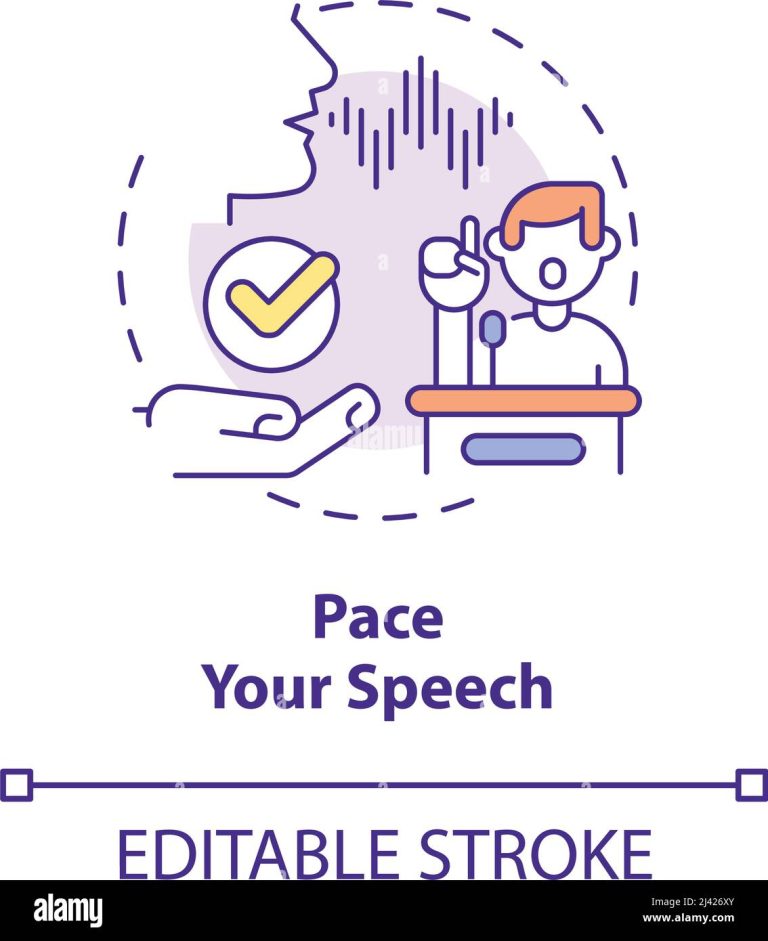What Are The Merits And Demerits Of Extemporaneous Speech?
What are the merits and demerits of extemporaneous speech? If you’ve ever found yourself standing in front of an audience, heart racing, trying to deliver a speech without a script, then you’ve experienced the thrill and challenge of extemporaneous speaking. In this style of public speaking, you rely on your knowledge, confidence, and ability to think on your feet. So, let’s dive in and explore the pros and cons of extemporaneous speech!
When it comes to extemporaneous speech, one of the biggest advantages is the freedom it gives you. Without the constraint of a script, you have the opportunity to connect with your audience on a more personal level. You can adapt your message in real-time, incorporating current events or even responding to the audience’s reactions. This flexibility allows for spontaneity and authenticity in your delivery.
On the other hand, extemporaneous speech also comes with its fair share of challenges. It requires a strong command of the subject matter, as you need to be able to speak confidently without relying on prepared notes. Additionally, the pressure to perform well in the moment can be daunting and may lead to nervousness or forgetting key points. It takes practice and preparation to strike the right balance between being spontaneous and delivering a well-structured speech.
So, whether you’re a seasoned speaker or just starting out, understanding the merits and demerits of extemporaneous speech is essential. It offers the opportunity for a dynamic and engaging delivery but requires careful planning and confidence in your abilities. So, let’s explore this fascinating style of public speaking further and uncover strategies for success!
Extemporaneous speech, also known as impromptu speaking, offers both merits and demerits. On the positive side, extemporaneous speech allows for spontaneity, engaging the audience with a natural and conversational style. It promotes critical thinking and improvisation skills. However, the challenge lies in managing time effectively and organizing thoughts on the spot. Additionally, nerves or lack of preparation can hinder the delivery. Understanding these pros and cons can help speakers harness the power of extemporaneous speech.

The Merits and Demerits of Extemporaneous Speech
Extemporaneous speech is a form of public speaking in which the speaker delivers a prepared speech without the use of a script or prompter. This style of speech involves the speaker relying on their knowledge, improvisation skills, and ability to deliver a coherent and engaging speech on the spot. While extemporaneous speech offers numerous benefits, it also has its limitations. In this article, we will explore the merits and demerits of extemporaneous speech and provide insights into its effectiveness in various contexts.
The Merits of Extemporaneous Speech
Extemporaneous speech, also known as impromptu speaking, offers several merits that make it a valuable and effective communication technique. Here are 10 extensive points that highlight the benefits of extemporaneous speech, along with illustrative examples:
1. Authenticity and Connection:
Extemporaneous speaking allows speakers to connect with the audience on a more genuine level. When speakers share their thoughts and ideas in a natural, unscripted manner, it fosters a sense of authenticity. For instance, a speaker addressing a group about overcoming challenges might share a personal anecdote that resonates deeply with the audience.
2. Adaptability and Flexibility:
Extemporaneous speakers are better equipped to adapt to unexpected changes during their speeches. This flexibility enables them to address questions, respond to feedback, or incorporate current events into their presentations. An example could be a business leader addressing a team about a sudden change in project direction, being able to address concerns promptly.
3. Enhanced Critical Thinking:
Speakers who engage in extemporaneous speech develop strong critical thinking skills. They must quickly organize thoughts, evaluate information, and synthesize their ideas. Imagine a student participating in a debate, having to analyze a topic and construct arguments on the spot.
4. Improved Communication Skills:
Extemporaneous speakers become adept at expressing their ideas clearly and concisely. This skill extends beyond public speaking, benefiting daily conversations and interactions. For instance, a community leader explaining a new initiative to residents would effectively convey the initiative’s benefits.
5. Engagement and Audience Interaction:
Extemporaneous speakers engage their audience by inviting questions and fostering interactive discussions. This participation enhances audience retention and involvement. An educator leading a classroom discussion might encourage students to ask questions related to the day’s topic.
6. Reduced Anxiety and Natural Delivery:
Extemporaneous speakers often experience less anxiety compared to those who memorize or read speeches verbatim. This approach allows for a more natural delivery style, as speakers aren’t tied to rigid memorization. An employee delivering a spontaneous thank-you speech at an office gathering may find it less nerve-wracking than reading from a script.
7. Effective Storytelling:
Extemporaneous speaking lends itself well to storytelling, as speakers can weave narratives based on the situation and audience feedback. Narratives and anecdotes enhance engagement and make the message more relatable. A nonprofit representative speaking at a fundraising event could share a heartfelt story to evoke empathy and motivate donations.
8. Enhanced Listening Skills:
Extemporaneous speakers need to actively listen to their audience’s questions and comments, allowing them to tailor their responses effectively. These honed listening skills extend to everyday interactions, improving interpersonal communication. A team leader discussing project concerns might listen carefully to team members’ feedback before addressing their queries.
9. Time Efficiency:
Extemporaneous speaking saves time in preparation compared to fully scripted speeches. While some preparation is still required, speakers do not need to memorize every word. This efficiency can be valuable in time-sensitive situations, like a manager addressing a team during a brief meeting.
10. Versatility in Various Settings:
Extemporaneous speaking is adaptable to a wide range of settings, from informal discussions to formal presentations. This versatility makes it a valuable skill in professional, academic, and social contexts. A community activist speaking at both a town hall meeting and a local club event can use the same extemporaneous approach to convey their message effectively.
In summary, extemporaneous speech offers a host of merits that enhance communication effectiveness, adaptability, and audience engagement. Through its authenticity, flexibility, and improvement of critical thinking skills, speakers can connect more deeply with their audiences and deliver impactful messages in a variety of settings.
The Demerits of Extemporaneous Speech
Extemporaneous speech, while effective in many situations, also has its share of potential drawbacks. Here are 10 points detailing the demerits of extemporaneous speech, along with examples illustrating each point:
- Lack of Precision: Extemporaneous speeches might lack precision due to the spontaneous nature of delivery. Speakers might not convey complex ideas accurately or thoroughly, leading to misunderstandings among the audience. For instance, a speaker discussing intricate scientific concepts might oversimplify details, resulting in an incomplete understanding by the audience.
- Inconsistencies: Speakers might struggle to maintain consistency in their arguments and examples. The lack of thorough planning can lead to contradictions or changes in the narrative, making it harder for the audience to follow the speech coherently. An example could be a speaker presenting one perspective on an issue and then inadvertently presenting a conflicting viewpoint later in the speech.
- Rambling and Lengthy Speeches: Extemporaneous speakers might ramble or extend their speeches beyond the allotted time. This can lead to audience disengagement and reduced impact. Imagine a speaker who gets carried away discussing one point, resulting in the other key points being rushed or omitted due to time constraints.
- Lack of Confidence: Some speakers might lack the confidence required to think on their feet and deliver a coherent extemporaneous speech. This can result in hesitations, filler words, and a diminished overall impact. For instance, a speaker who stammers or repeatedly says “uh” and “um” can detract from the speech’s authority.
- Difficulty Handling Tough Questions: In situations where the audience poses challenging questions, speakers might struggle to provide well-considered responses. Without adequate preparation, speakers could provide inaccurate or uninformed answers, damaging their credibility. For example, a political candidate might struggle to address a complex economic query without prior research.
- Risk of Offending or Alienating: Without the ability to fully control language and content, speakers might inadvertently use phrasing that offends or alienates certain audience members. A casual comment or joke that’s well-intentioned could unintentionally spark controversy or discomfort among attendees.
- Limited Vocabulary and Language Fluency: Speakers might find it challenging to articulate ideas eloquently and use an extensive vocabulary without proper preparation. This could lead to repetitive language or struggling to express nuanced concepts, affecting the overall effectiveness of the speech.
- Unequal Coverage of Topics: Extemporaneous speakers might focus excessively on familiar or personal topics, neglecting broader or more critical subjects. This skewed coverage could lead to imbalanced discussions and potentially overlook key issues relevant to the audience.
- Reduced Audience Engagement: A lack of structured organization and well-defined transitions can hinder audience engagement. Extemporaneous speeches might fail to captivate listeners and maintain their interest, leading to reduced retention of the message.
- Overdependence on Personality: Speakers with charismatic personalities might rely on their charm rather than substantive content. This approach can diminish the quality of information shared and result in shallow, surface-level speeches lacking depth and insight.
In conclusion, while extemporaneous speech offers spontaneity and authenticity, its drawbacks include potential inaccuracies, inconsistencies, and difficulties in maintaining engagement. Recognizing these demerits can guide speakers to strike a balance between the benefits and limitations of extemporaneous delivery, ensuring that their messages are effectively communicated to the audience.
Factors to Consider for Effective Extemporaneous Speaking
While extemporaneous speech has its merits and demerits, several factors can contribute to its effectiveness:
Understanding the Audience
Before delivering an extemporaneous speech, it is crucial to understand the audience’s background, interests, and expectations. This knowledge enables the speaker to tailor their message, language, and examples to resonate with the audience effectively.
Practice and Preparation
Although extemporaneous speaking does not involve a prepared script, it still necessitates practice and preparation. Speakers should rehearse their key points, main arguments, and transitions to ensure a smooth and coherent flow during the speech.
Developing Strong Improvisation Skills
Since extemporaneous speaking relies on improvisation, it is vital to develop strong improvisation skills. This includes the ability to think quickly, respond to unexpected questions, and adapt the speech in real-time. Practice improvisation exercises and techniques to enhance these skills.
Key Takeaways: The Merits and Demerits of Extemporaneous Speech
- Merits of extemporaneous speech:
– Allows for flexibility and adaptability during delivery. - Demerits of extemporaneous speech:
– Requires thorough preparation and research beforehand. - Merits of extemporaneous speech:
– Enhances speaker’s credibility and authenticity. - Demerits of extemporaneous speech:
– May lead to potential mistakes, such as forgetting important points. - Merits of extemporaneous speech:
– Encourages active listening and engagement from the audience.
Frequently Asked Questions
Here are some common questions about extemporaneous speech, with answers that provide insights into its merits and demerits.
1. How can extemporaneous speech enhance my communication skills?
Extemporaneous speech offers several merits when it comes to improving your communication skills. First and foremost, it helps develop your ability to think on your feet. By having to speak spontaneously and present coherent ideas without prior preparation, you become better at organizing your thoughts and delivering them in a clear and concise manner. Additionally, extemporaneous speech allows you to practice active listening and critical thinking, as you need to quickly analyze and respond to the topic at hand.
Furthermore, extemporaneous speech fosters adaptability and versatility. It enables you to adjust your delivery style and content according to the audience, making your message more relatable and engaging. These skills can be valuable not only in public speaking but also in everyday conversations and professional settings, where the ability to communicate effectively is highly sought after.
2. What are the demerits of extemporaneous speech?
While extemporaneous speech has its merits, there are also a few potential demerits to consider. One challenge is the risk of going off-topic or losing clarity due to the lack of preparation time. Without detailed planning and research, there is a possibility of presenting inaccurate information or failing to address all aspects of the topic adequately. This can result in a less polished delivery and may impact the credibility of your speech.
Additionally, extemporaneous speech requires strong impromptu speaking skills, which might be a disadvantage for individuals who struggle with on-the-spot thinking or suffer from stage fright. The pressure to speak eloquently and confidently without any prior written outline can be daunting for some, potentially affecting their overall performance. It is essential to practice and build these skills to mitigate any drawbacks and feel more at ease when delivering extemporaneous speeches.
3. Can extemporaneous speech be used in formal settings like academic presentations?
Absolutely! Extemporaneous speech can be an excellent approach for formal settings, including academic presentations. While formal speeches often involve thorough preparation, extemporaneous delivery can add a natural and engaging element to your presentation. By combining your subject knowledge with the ability to speak spontaneously, you show your understanding of the topic and connect with your audience on a deeper level.
Extemporaneous speaking in academic presentations allows for dynamic interaction between the speaker and the audience, as it encourages questions and dialogue. This can foster a more immersive and collaborative learning environment where ideas are shared and discussed openly. However, it is essential to strike a balance between spontaneity and structure, ensuring that your extemporaneous speech aligns with the overall objectives of your formal presentation.
4. Are there any specific techniques to improve extemporaneous speaking skills?
Indeed, there are techniques that can help improve your extemporaneous speaking skills. One effective method is practicing impromptu speaking regularly. Set aside time to speak on various topics without any prior preparation. This helps train your brain to think quickly and articulate ideas effectively. Consider participating in debates or impromptu speech competitions to further refine your skills and gain confidence.
Another technique is to enhance your knowledge base by staying well-informed about current events, general knowledge, and diverse topics. The more you know, the more material you will have to draw upon when delivering your speech. Additionally, practicing active listening and critical thinking will enable you to engage with the topic and respond thoughtfully.
5. How can extemporaneous speech benefit professional development?
Extemporaneous speech can bring significant benefits to your professional development. The ability to speak confidently, adapt to different audiences, and present ideas clearly and concisely are highly valued in the workplace. By honing your extemporaneous speaking skills, you improve your chances of successfully communicating ideas, whether in team meetings, presentations, or client interactions.
Moreover, extemporaneous speech enhances your capacity to handle unexpected situations and think critically under pressure. This can prove invaluable in job interviews, where you may be asked to answer challenging questions on the spot. The confidence and composure gained through practicing extemporaneous speaking can set you apart as a strong communicator and show employers that you can handle impromptu situations with grace and effectiveness.

Advantages of Extemporaneous Speaking
Summary
So now you know the good and not-so-good things about giving an extemporaneous speech. On the positive side, it can help you think on your feet, improve your communication skills, and engage your audience. However, it can also be nerve-wracking, make you feel unprepared, and lead to errors or rambling. It’s important to weigh both the merits and demerits to determine if extemporaneous speaking is the right approach for you.



